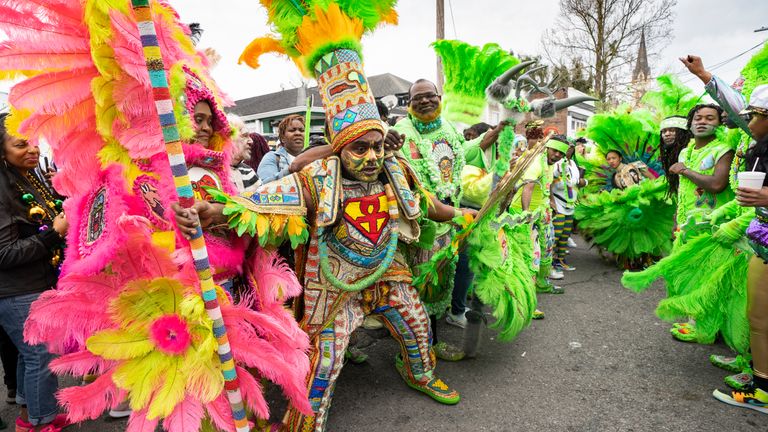Coronavirus: The celebrations that helped spread COVID-19 like wildfire in New Orleans
Experts say February's Mardi Gras accelerated the coronavirus outbreak in New Orleans.
Wednesday 15 April 2020 09:14, UK
The last time I came to Bourbon Street in New Orleans it was an assault on the senses - the bars were packed, trumpets and jazz piano filled the air, and so did the smell of gumbo, luring us into the busy restaurants.
Today it's empty - everywhere is boarded up.
The economy, based so heavily on tourism, stands still - free of visitors and bereft of noise.
But just two months ago, in late February, it was a very different scene.
City officials decided to press ahead with Mardi Gras festivities and tens of thousands of people spilled onto the streets of this city.
At the time, sports events were taking place across the country and the federal government wasn't yet recommending social distancing.
Now, tragically, experts believe the Mardi Gras celebrations helped coronavirus to spread like wildfire here and two months later, New Orleans had the highest death rate in America.
:: Listen to Divided States on , , , and
It spread so fast and wide, it's wiped out multiple generations of families.
The Franklins lost four members of theirs in just 12 days.
"First, my uncle passed," Anthony Franklin tells me.
"Then a few days later, my grandmother. And a few days later, my dad passed. And a few days after that, my other uncle died."
They were all in the same ward, all on ventilators and not one of them got to see their loves ones before they died.
The Franklins suspect the virus may have spread in the family after they got together to celebrate his grandmother Antoinette's 86th birthday - but no one can be sure.
Jacqueline, Anthony's mother, is sitting down to speak with us in the throes of her intense grief because she desperately wants to urge others to take the virus more seriously.
"It's unbelievable. And what's the hardest for me is some people really think that doesn't exist and it's not real. And we buried four family members.
"We buried my husband and two of his brothers in the same funeral. Three caskets in a row. And I just want the world to know that this is real.
"This is unbelievably real."
Jacqueline is alarmed by how many people she's still seeing without masks. Louisiana is a state where people live and love closely, she says. A culture where families are large and embrace each other with lots of hugs and handshakes.
She says it's proved to be a hard habit to kick.
But local author Maurice Ruffin says poverty and racism is also at play here.
"This is a place where we don't have a great healthcare system, where people don't have a lot of money and there is some historical racism that has made these factors worse for people in my community," he says.
Many black people, he says, are the ones working right now, many in the service industries, driving the trains, the buses, at the gas stations - without the luxury of being able to stay at home and many without proper protection.
At the Rebuild Center, the city's homeless are trying to practise social distancing.
They line up six feet apart to try to get food.
The line stretches right around the church. It's much busier than normal - most of the shelters have closed and so have the soup kitchens. A few have masks, but for this community, there is very little protection available.
Eighty miles away in Baton Rouge, we see a very different side of Louisiana - where attending church is more important than honouring the rules.
At 6.30pm on Easter Sunday, a stream of people turn up to worship at Life Tabernacle Church.
People have their temperature taken at the door and there is hand sanitiser on a table.
Inside, a jubilant congregation of about 200 people sing and clap together.
At the morning service I'm told there were more than 1,000 people in attendance from all over the United States. The governor may have banned mass gatherings, but Pastor Tony Spell tells me he doesn't take his orders from politicians.
"This freedom that I have doesn't come from my governor, it comes from my God."
I ask him what he says to those who accuse him of being irresponsible and putting lives at risk.
"I say: 'Don't be a hypocrite'. Anybody on the roads, in a retail store such as Walmart, a liquor store. If you go to those places and don't go to church, you're two faced."
He is unapologetic.
Many who came to attend his service feel they are safe and insulated by God and won't let anything get in the way of their right to pray together.
It is a sentiment and an instinct and America will likely spend months wrestling with as it struggles to overcome COVID-19.












